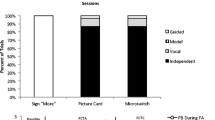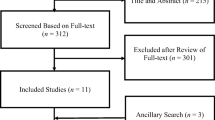Abstract
Researchers have shown that behavioral interventions that incorporate communication as a focus have demonstrated efficacy for individuals with intellectual and developmental disabilities (IDD). Researchers have demonstrated that individuals with IDD allocate responding to one communicative response modality over others when multiple communicative modalities produce reinforcement in the context of a concurrent-schedules arrangement. Identifying preference for communicative response modality provides one approach to incorporating aspects of social validity in the design of behavioral interventions for individuals with IDD, placing additional importance on demonstrations of the robustness of this preference. In the current study, we evaluated preference among concurrently available communication modalities for 14 individuals with IDD. Results of the study replicated previous, similar research in that the vast majority of individuals demonstrated a preference between communicative response modalities. We discuss the results within the context of social validity and implications for intervention.


Similar content being viewed by others
Notes
The study took place across two university based applied behavior analysis research enterprises. While many of the procedures were similar across sites, some variations existed.
References
Association for Behavior Analysis International (2004). 30th annual convention; Boston, MA; 2004; Program search resultshttps://www.abainternational.org/events/program-details/search-result.aspx?stpConvId=31&stpIsExact=false&stpSearchType1=KeyPhrase&stpSearchValue1=social+validity
Association for Behavior Analysis International (2022). 48th annual convention; Boston, MA; 2022; Program search resultshttps://www.abainternational.org/events/program-details/search-result.aspx?stpConvId=90&stpIsExact=false&stpSearchType1=KeyPhrase&stpSearchValue1=social+validity
Association for Behavior Analysis International. (2019). 45th annual convention: Chicago, IL; 2019; program search results. &stpIsExact=false&stpSearchType1=KeyPhrase&stpSearchValue1=social+validity. https://www.abainternational.org/events/program-details/search-result.aspx?stpConvId=57.
Bailey, J., McComas, J. J., Benavides, C., & Lovascz, C. (2002). Functional assessment in a residential setting: Identifying an effective communicative replacement response for aggressive behavior. Journal of Developmental and Physical Disabilities, 14(4), 353–369. https://doi.org/10.1023/A:1020382819146.
Bannerman, D. J., Sheldon, J. B., Sherman, J. A., & Harchik, A. E. (1990). Balancing the right to habilitation with the right to personal liberties: The rights of people with developmental disabilities to eat too many doughnuts and take a nap. Journal of Applied Behavior Analysis, 23(1), 79–89. https://doi.org/10.1901/jaba.1990.23-79.
Callahan, K., Hughes, H. L., Mehta, S., Toussaint, K. A., Nichols, S. M., Ma, P. S., Kutlu, M., & Wang, H-T. (2017). Social validity of evidence-based practices and emerging interventions in autism. Focus on Autism and Other Developmental Disabilities, 32(3), 188–197. https://doi.org/10.1177/1088357616632446.
Ferguson, J. L., Cihon, J. H., Leaf, J. B., Van Meter, S. M., McEachin, J., & Leaf, R. (2019). Assessment of social validity trends in the journal of applied behavior analysis. European Journal of Behavior Analysis, 20(1), 146–157. https://doi.org/10.1080/15021149.2018.1534771.
Fisher, W., Piazza, C. C., Bowman, L. G., Hagopian, L. P., Owens, J. C., & Slevin, I. (1992). A comparison of two approaches for identifying reinforcers for persons with severe and profound disabilities. Journal of Applied Behavior Analysis, 25(2), 491–498. https://doi.org/10.1901/jaba.1992.25-491.
Friard, O., Gamba, M., & Fitzjohn, R. (2016). BORIS: A free, versatile open-source event‐logging software for video/audio coding and live observations. Methods in Ecology and Evolution, 7(11), 1325–1330. https://doi.org/10.1111/2041-210X.12584.
Girtler, S. N., Unholz-Bowden, E. K., Shipchandler, A., McComas, J. J., & Kolb, R. (2023). Use of augmentative and alternative communication by individuals with Rett Syndrome, Part 1: Page-linking. Journal of Developmental and Physical Disabilities. https://doi.org/10.1007/s10882-023-09903-x. Advance online publication.
Hanley, G. P., Piazza, C. C., Fisher, W. W., Contrucci, S. A., & Maglieri, K. A. (1997). Evaluation of client preference for function-based treatment packages. Journal of Applied Behavior Analysis, 30(3), 459–473. https://doi.org/10.1901/jab.1997.30-459.
Harding, J. W., Wacker, D. P., Berg, W. K., Cooper, L. J., Asmus, J., Mlela, K., & Muller, J. (1999). An analysis of choice making in the assessment of young children with severe behavior problems. Journal of Applied Behavior Analysis, 32(1), 63–82. https://doi.org/10.1901/jaba.1999.32-63.
Iwata, B. A., Dorsey, M. F., Slifer, K. J., Bauman, K. E., & Richman, G. S. (1994). Toward a functional analysis of self-injury. Journal of Applied Behavior Analysis, 27(2), 197–209. https://doi.org/10.1901/jaba.1994.27-197 (Reprinted from Analysis and Intervention in Developmental Disabilities, 2(1), 3–20, 1982; https://doi.org/10.1016/0270-4684(82)90003-9).
Peterson, S. M., Aljadeff-Abergel, E., Eldridge, R. R., VanderWeele, N. J., & Acker, N. S. (2021). Conceptualizing self-determination from a behavioral perspective: The role of choice, self-control, and self-management. Journal of Behavioral Education, 30, 299–318. https://doi.org/10.1007/s10864-020-09368-4.
Ringdahl, J. E., Falcomata, T. S., Christensen, T. J., Bass-Ringdahl, S. M., Lentz, A., Dutt, A., & Schuh-Claus, J. (2009). Evaluation of a pre-treatment assessment to select mand topographies for functional communication training. Research in Developmental Disabilities, 30(2), 330–341. https://doi.org/10.1016/j.ridd.2008.06.002.
Ringdahl, J. E., Berg, W. K., Wacker, D. P., Ryan, S., Ryan, A., Crook, K., & Molony, M. (2016). Further demonstrations of individual preference among mand modalities during functional communication training. Journal of Developmental and Physical Disabilities, 28(6), 905–917. https://doi.org/10.1007/s10882-016-9518-9.
Ringdahl, J. E., Berg, W. K., Wacker, D. P., Crook, K., Molony, M. A., Vargo, K. K., Neurnberger, J. E., Zabala, K., & Taylor, C. J. (2018). Effects of response preference on resistance to change. Journal of the Experimental Analysis of Behavior, 109(1), 265–280. https://doi.org/10.1002/jeab.308.
Roane, H. S., Vollmer, T. R., Ringdahl, J. E., & Marcus, B. A. (1998). Evaluation of a brief stimulus preference assessment. Journal of Applied Behavior Analysis, 31(4), 605–620. https://doi.org/10.1901/jaba.1998.31-605.
Schieltz, K. M., Wacker, D. P., Suess, A. N., Graber, J. E., Lustig, N. H., & Detrick, J. (2020). Evaluating the effects of positive reinforcement, instructional strategies, and negative reinforcement on problem behavior and academic performance: An experimental analysis. Journal of Developmental and Physical Disabilities, 32, 339–363. https://doi.org/10.1007/s10882-019-09696-y.
Tiger, J. H., Hanley, G. P., & Bruzek, J. (2008). Functional communication training: A review and practical guide. Behavior Analysis in Practice, 1(1), 16–23. https://doi.org/10.1007/BF03391716.
Tincani, M., & Travers, J. (2019). Replication research, publication bias, and applied behavior analysis. Perspectives on Behavior Science, 42(1), 59–75. https://doi.org/10.1007/s40614-019-00191-5.
Unholz-Bowden, E. K., Girtler, S. N., Shipchandler, A., McComas, J. J., & Kolb, R. (2023). Use of augmentative and alternative communication by individuals with Rett Syndrome Part 2: High-tech and low-tech devices. Journal of Developmental and Physical Disabilities. https://doi.org/10.1007/s10882-023-09902-y. Advance online publication.
Winborn-Kemmerer, L., Ringdahl, J. E., Wacker, D. P., & Kitsukawa, K. (2009). A demonstration of individual preference for novel mands during functional communication training. Journal of Applied Behavior Analysis, 42(1), 185–189. https://doi.org/10.1901/jaba.2009.42-185.
Wolf, M. M. (1978). Social validity: The case for subjective measurement or how applied behavior analysis is finding its heart. Journal of Applied Behavior Analysis, 11(2), 203–214. https://doi.org/10.1901/jab.1978.11-203.
Funding
This research was supported by the Eunice Kennedy Shriver National Institutes of Child Health & Human Development (award R01HD069377) and the National Institutes of Deafness and Other Communication Disorders (award R21DC015021) of the National Institutes of Health. The content is solely the responsibility of the authors and does not necessarily represent the official views of the National Institutes of Health.
Author information
Authors and Affiliations
Corresponding author
Ethics declarations
Ethical Approval
Approval for this study was obtained from the ethics committees of the University of Georgia and the University of Minnesota. The procedures used in this study adhere to the tenets of the Declaration of Helsinki.
Informed Consent
Signed informed consent, including consent regarding the publication of their data, was obtained from legal guardians.
Conflict of Interest
The authors have no relevant financial or non-financial interests to disclose.
Additional information
Publisher’s Note
Springer Nature remains neutral with regard to jurisdictional claims in published maps and institutional affiliations.
Rights and permissions
Springer Nature or its licensor (e.g. a society or other partner) holds exclusive rights to this article under a publishing agreement with the author(s) or other rightsholder(s); author self-archiving of the accepted manuscript version of this article is solely governed by the terms of such publishing agreement and applicable law.
About this article
Cite this article
Ringdahl, J.E., Schieltz, K.M., O’Brien, M.J. et al. Communication Modality Preference and the Social Validity of Functional Communication and Mand Training. J Dev Phys Disabil (2024). https://doi.org/10.1007/s10882-024-09956-6
Accepted:
Published:
DOI: https://doi.org/10.1007/s10882-024-09956-6




